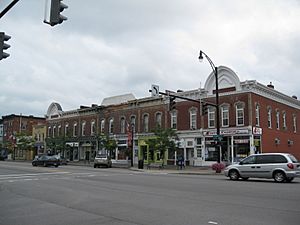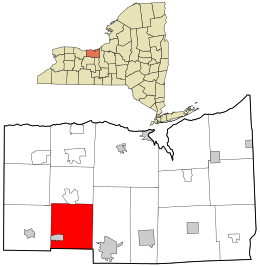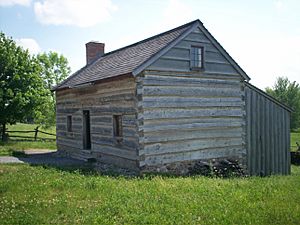Palmyra, New York facts for kids
Quick facts for kids
Palmyra, New York
|
|
|---|---|

The East Main Street Commercial Historic District
|
|

Location in Wayne County and the state of New York.
|
|
| Country | United States |
| State | New York |
| County | Wayne |
| Settled | 1789 |
| Established | January 16, 1789 |
| Government | |
| • Type | Town Board |
| Area | |
| • Total | 33.67 sq mi (87.20 km2) |
| • Land | 33.44 sq mi (86.60 km2) |
| • Water | 0.23 sq mi (0.61 km2) |
| Elevation | 486 ft (148 m) |
| Population
(2016)
|
|
| • Total | 7,975 |
| • Estimate
(2016)
|
7,638 |
| • Density | 228.44/sq mi (88.20/km2) |
| Time zone | UTC-5 (Eastern (EST)) |
| • Summer (DST) | UTC-4 (EDT) |
| ZIP code |
14522
|
| Area code(s) | 315 and 680 |
| FIPS code | 36-56231 |
| Website | http://www.palmyrany.com/ |
Palmyra is a town located in the southwestern part of Wayne County, New York, United States. In 2010, about 7,975 people lived there. The town was named after the ancient city of Palmyra in Syria.
Palmyra is also home to a village that shares the same name, Palmyra. The town is located about 20 miles (32 km) southeast of the city of Rochester.
Contents
History of Palmyra
The area where Palmyra is located has a long history. Ancient people from the Adena culture left behind large mounds of earth.
Palmyra was part of a large land deal called the Phelps and Gorham Purchase. The Town of Palmyra was first created in 1789. It was originally called "Swift's Landing" after its founder, John Swift. It was also known as the "District of Tolland." The name "Palmyra" was chosen in 1796. By 1800, nearly a thousand people lived in the town.
A very important waterway, the Erie Canal, reached Palmyra in 1822. The canal was fully completed in 1825. Palmyra is now part of the Erie Canalway National Heritage Corridor. In 1823, the Town of Macedon was created from a part of Palmyra's land. This happened when Wayne County was formed from Ontario County.
The Latter Day Saint Movement Begins Here
Palmyra is famous as the place where the Latter Day Saint movement began. Its founder, Joseph Smith, lived on a farm that was partly in Palmyra and partly in Manchester. He said that God and Jesus Christ visited him in 1820. This event is known as the First Vision.
In 1830, the Book of Mormon was first printed in the village of Palmyra. This happened at the Book of Mormon Historic Publication Site. Starting in the early 1900s, the Church of Jesus Christ of Latter-day Saints began to buy and restore many historic places in the area. These places are connected to the early history of their church. In 1997, the Smith family's log cabin was rebuilt on its original spot. In 2000, the church built the Palmyra New York Temple on part of the old Smith farm.
Geography and Location
The town of Palmyra covers about 33.7 square miles (87.3 km²). Most of this area, about 33.5 square miles (86.7 km²), is land. The rest, about 0.2 square miles (0.5 km²), is water.
The Erie Canal flows through the town, passing right through the Village of Palmyra. You can also find the Erie Canal Heritage Trail here. This trail is great for walking and other outdoor activities.
The southern border of the town is also the border of Ontario County. Two main roads, New York State Route 21 (running north-south) and New York State Route 31 (running east-west), meet in Palmyra village.
Education in Palmyra
Palmyra has several schools that serve the community. These include Palmyra-Macedon High School, Palmyra-Macedon Middle School, and Palmyra-Macedon Primary School. All of these schools are located within the town.
The Palmyra Community Library is a public library. It offers many resources like books, magazines, videos, and audiobooks. You can also find local history information there. The library also hosts different events for the community throughout the year. Free wireless internet and computers are available for everyone to use.
In 2011, the library moved to a new location. It is now in the renovated Garlock Packing Company Building. The move allowed the library to offer more resources, provide more seating, and create spaces for community gatherings.
Population and People
As of 2010, there were 7,975 people living in Palmyra. There were 3,255 households and 2,175 families. The population density was about 236.6 people per square mile (91.4 people per km²).
Most people in Palmyra are White (96.7%). Other groups include Black or African American (0.8%), Native American (0.4%), and Asian (0.5%). About 1.4% of the population identified as Hispanic or Latino.
The average age of people in Palmyra was 41.7 years. About 25% of the population was under 20 years old.
The average income for a household in the town was $47,102. For families, the average income was $57,770. About 16.7% of all people in Palmyra lived below the poverty line. This included 27.5% of those under 18 years old.
Communities and Places in Palmyra
- Cooney Crossing – This is a place near the western edge of the town.
- East Palmyra – This is a small village (hamlet) near the eastern town line. The East Palmyra Presbyterian Church is a historic building here.
- Palmyra – This is the main village within the town, located on the Erie Canal.
- Red Creek – This is a stream found north of Palmyra village.
- Wide Waters – This is a long, narrow pond that is part of the Erie Canal. It is partly in the southeastern corner of the town.
Notable People from Palmyra
Many interesting people have connections to Palmyra:
- E. B. Grandin (1806–1845) – He was the printer who produced the first edition of the Book of Mormon.
- Increase A. Lapham (1811–1875) – He is known as the "father" of the United States Weather Service.
- William T. Sampson (1840–1902) – He was an Admiral in the Spanish–American War.
- Joseph Smith (1805–1844) – He was the founder of the Latter Day Saint movement. He lived in Palmyra from 1816 to 1825 and again in 1830.
- Margaret Aldrich Smith (1863–1929) – She was the American First Lady of Guam and was born in Palmyra.
- Henry Wells (1805–1878) – He was the founder of American Express and a co-founder of Wells Fargo.
See also
 In Spanish: Palmyra (Nueva York) para niños
In Spanish: Palmyra (Nueva York) para niños
 | Laphonza Butler |
 | Daisy Bates |
 | Elizabeth Piper Ensley |



